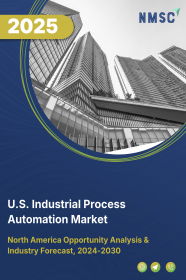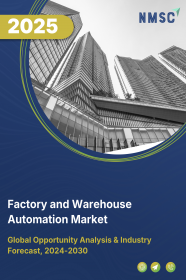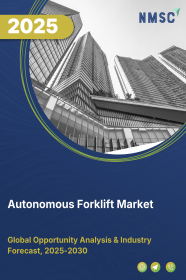
U.S. Industrial Process Automation Market by Component (MES [Hardware, Software, Services]; DCS [Hardware, Software, Services]; PLC [Hardware, Software, Services]; SCADA [Hardware, Software, Services]; Field Instruments; Industrial Robots; Human Machine Interface; Industrial PCs; Process Analyzers & Drives) and by End User (Oil & Gas, Chemicals & Refining, Energy & Power, Pulp & Paper, Metals & Mining, Pharma, & Others) – Global Opportunity Analysis and Industry Forecast, 2025–2030
Industry: Semiconductor & Electronics | Publish Date: 08-Oct-2025 | No of Pages: 159 | No. of Tables: 121 | No. of Figures: 66 | Format: PDF | Report Code : SE977
Industry Outlook
The U.S. Industrial Process Automation Market size was valued at USD 16.46 billion in 2024 and is projected to grow to USD 17.60 billion by 2025. Additionally, the industry is expected to continue its growth trajectory, reaching USD 21.88 billion by 2030, at a CAGR of 4.86% from 2025 to 2030.
Workforce shortages and rising labor costs are key drivers of the U.S. industrial process automation market growth, as companies face challenges in attracting skilled workers and seek automation to enhance productivity, reduce operational expenses, and optimize mining and other industrial processes.
The adoption of Industry 4.0 technologies, including smart factories, networked systems, and advanced networking solutions such as 5G, further accelerates market growth by enabling real-time data transfer, machine-to-machine communication, and improved manufacturing efficiency. However, the lack of uniform standards across industries creates integration challenges and increases complexity, limiting broader adoption.
Looking ahead, the integration of artificial intelligence (AI) and machine learning (ML) offers significant growth opportunities, enabling predictive maintenance, real-time monitoring, and data-driven optimization of production processes, ultimately enhancing efficiency, reducing errors, and supporting smarter, more competitive industrial operations.
Workforce Shortages and Rising Labor Costs Fuel Market Growth
The industrial process automation market in the U.S. is strongly driven by labor shortages and increasing labor costs. Companies face difficulties in attracting skilled workers due to an aging population and declining interest in industrial jobs. According to the International Labour Organization (ILO) 2025, labor costs in the U.S. averaged USD 81.8 per hour.
Automation technologies help bridge these workforce gaps, enhance productivity, and reduce operational expenses, thereby stimulating market expansion. Additionally, the growing consolidation of mining operations supports productivity gains and process optimization, further driving demand for automation solutions.
Expansion in the Automation Sector Drives the Market
The penetration of Industry 4.0 technologies, including smart factories and networked systems, provides a significant impetus to the market. Advanced networking solutions such as 5G enable real-time data transfer, machine-to-machine communication, optimized manufacturing efficiency, and reduced downtime.
For instance, in September 2024, Ericsson announced enterprise-led adoption of private 5G networks, showcasing solutions that support efficient automation deployment. Such investments accelerate the adoption of automation technologies to maximize operational efficiency across industries in the U.S.
Lack of StandardizationHinders Market Expansion
The absence of uniform standards across industries creates challenges for industrial robotics in the U.S. Compatibility issues between different automation systems and technologies make integration with existing infrastructure difficult, increasing costs and complexity. This lack of standardization slows the adoption of new automation solutions and limits operational efficiency, particularly for enterprises with legacy systems.
Integration of AI and Machine Learning Enables Smarter Automation
The adoption of artificial intelligence (AI) and machine learning (ML) presents a key growth opportunity in the U.S. industrial automation market. AI and ML enable predictive maintenance, real-time monitoring, and data-driven optimization of production processes. By leveraging intelligent automation, companies improve efficiency, reduce errors, and make faster operational decisions. This integration positions industries to address workforce challenges, enhance competitiveness, and accelerate the overall adoption of advanced automation solutions.
Competitive Landscape
The promising players operating in the U.S. industrial process automation industry include Siemens AG, Rockwell Automation, Inc., Emerson Electric Co., Schneider Electric SE, ABB Ltd., Honeywell International Inc., Yokogawa Electric Corporation, Mitsubishi Electric Corporation, Omron Corporation, Endress+Hauser Group, Valmet Oyj, Azbil Corporation, Yaskawa Electric Corporation, Beckhoff Automation GmbH & Co. KG, and KROHNE Group, and Others.
U.S. Industrial Process Automation Market Key Segments
By Component
-
Manufacturing Execution Systems (MES)
-
Hardware
-
Software
-
Services
-
-
Distributed Control Systems (DCS)
-
Hardware
-
Software
-
Services
-
-
Programmable Logic Control (PLC)
-
Hardware
-
Software
-
Services
-
-
Supervisory Control and Data Acquisition (SCADA)
-
Hardware
-
Software
-
Services
-
-
Field Instruments
-
Industrial Robots
-
Human Machine Interface (HMI)
-
Industrial PCs
-
Process Analyzers and Drives
By End User
-
Oil and Gas
-
Chemicals and Refining
-
Energy and Power
-
Pulp and Paper
-
Metals and Mining
-
Pharma
-
Cement & Glass
-
Others
Key Players
-
Siemens AG
-
Schneider Electric SE
-
ABB Ltd.
-
Honeywell International Inc.
-
Yokogawa Electric Corporation
-
Mitsubishi Electric Corporation
-
Omron Corporation
-
Endress+Hauser AG
-
Valmet Oyj
-
Azbil Corporation
-
Yaskawa Electric Corporation
-
Beckhoff Automation GmbH & Co. KG
-
KROHNE Group
Report Scope and Segmentation
|
Parameters |
Details |
|
Market Size Value in 2025 |
USD 17.60 Billion |
|
Revenue Forecast in 2030 |
USD 21.88 Billion |
|
Value Growth Rate |
CAGR of 4.86%from 2025 to 2030 |
|
Analysis Period |
2024–2030 |
|
Base Year Considered |
2024 |
|
Forecast Period |
2025–2030 |
|
Market Size Estimation |
Billion (USD) |
|
Growth Factors |
|
|
Companies Profiled |
15 |
|
Market Share |
Available for 10 companies |
|
Customization Scope |
Free customization (equivalent to up to 80 working hours of analysts) after purchase. Addition or alteration to country, regional, and segment scope. |
|
Pricing and Purchase Options |
Avail customized purchase options to meet your exact research needs. |

















 Speak to Our Analyst
Speak to Our Analyst
























